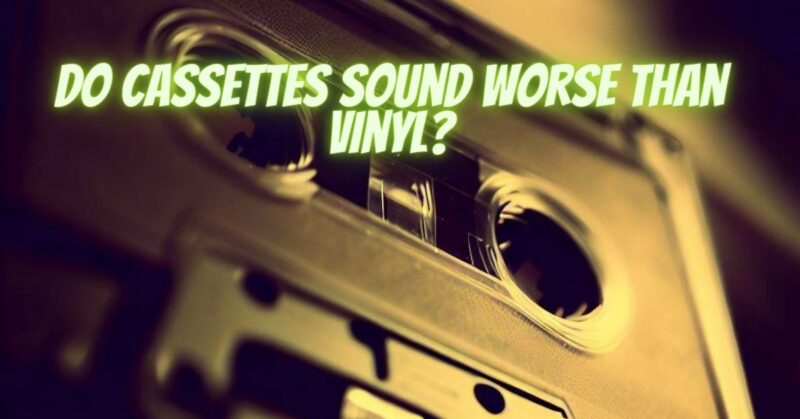The debate between cassette tapes and vinyl records has been ongoing for decades, with passionate arguments on both sides. While vinyl records have long been celebrated for their audio quality, cassette tapes have often been criticized for their perceived inferior sound. In this article, we will delve into the discussion and debunk the myth surrounding cassette tapes, exploring whether they truly sound worse than vinyl.
- Different Sound Characteristics: Cassettes and vinyl records offer distinct sound characteristics. Vinyl records are known for their warm, rich, and full-bodied sound, while cassette tapes have a different sonic character. Cassettes can possess a certain charm with their characteristic tape hiss, dynamic range limitations, and a slight degradation of sound quality over time.
- Factors Influencing Sound Quality: The sound quality of both cassettes and vinyl records can be influenced by various factors. The quality of the recording, mastering, and production process plays a significant role in determining the overall sound. Additionally, the playback equipment, such as cassette decks and turntables, and the condition of the tapes and records themselves can impact the audio experience.
- Analog vs. Digital: Vinyl records are analog recordings, capturing the original sound wave directly, while cassette tapes are an analog medium that can also incorporate digital recordings. Some argue that the analog nature of vinyl results in a more authentic and natural sound, whereas the tape format of cassettes may introduce certain limitations and artifacts.
- Portability and Durability: One area where cassettes excel over vinyl is portability. Cassettes are compact, lightweight, and can be played in portable cassette players. This convenience made cassettes popular for on-the-go listening. However, their compact size and delicate tape mechanisms can make them more susceptible to damage and wear compared to vinyl records.
- Listener Preference and Nostalgia: Sound quality is subjective, and listener preference plays a significant role. Some individuals appreciate the unique sound characteristics of cassette tapes, including the warmth, nostalgia, and lo-fi aesthetics. Others prefer the pristine sound quality and larger format artwork offered by vinyl records. Personal nostalgia and emotional connection to a format can also influence one’s perception of sound quality.
- Technology and Production Quality: Advancements in cassette tape technology, such as chrome or metal formulations and improved tape decks, have led to higher-quality cassette recordings. Additionally, cassette reissues and remasters are carefully produced to ensure optimal sound quality. It is essential to consider the production quality and source material when assessing the sound of cassette tapes.
Conclusion:
Contrary to the myth that cassette tapes sound inherently worse than vinyl, it is important to recognize that both formats offer distinct sound characteristics. The perceived sound quality of cassettes is influenced by factors such as recording quality, mastering, playback equipment, and personal preference. While vinyl records are celebrated for their warm and rich sound, cassette tapes have their own unique charm and appeal, including portability and nostalgic aesthetics. Ultimately, the appreciation of sound quality is subjective, and individual preferences and emotional connections to a format play a significant role in one’s perception. It is essential to embrace the diverse sonic experiences offered by both cassettes and vinyl, appreciating each format for its unique qualities.


